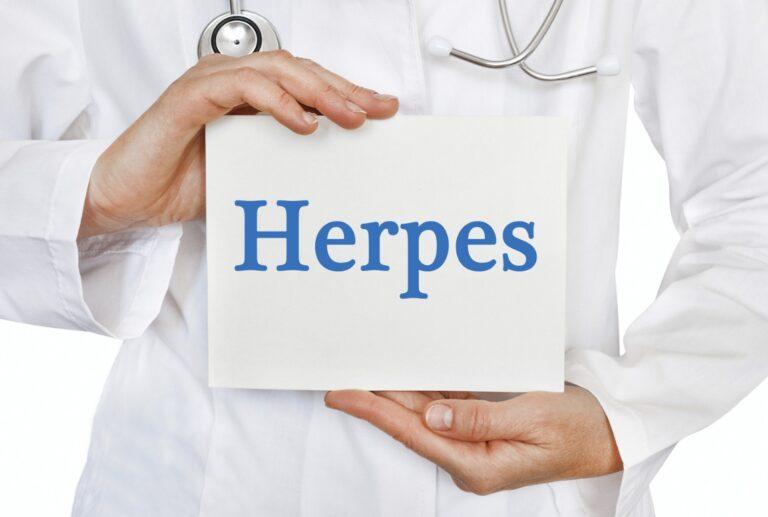Herpes is one of the most common and widespread viral infections in the world, partly because it’s so easy to transmit. According to The Centers for Disease Control and Prevention (CDC) around 1 in 5 people in the US have genital herpes. But if you practice safe sex you can’t catch herpes, right?
Unfortunately, no. Safe sex isn’t enough. And the real kicker is that there are other ways you can catch herpes that don’t even involve sex. Here’s what you need to know.
What is herpes?
Herpes is the name of a family of viruses that can infect people. The herpes viruses cause a range of diseases, but most often they cause skin infections which result in blisters, pain and swelling and inflammation. When a herpes virus infects your face (oral herpes sores) it can cause cold sores and when a herpes virus infects the skin on and around your genital area and your anus it causes genital herpes. Genital herpes is a sexually transmitted disease (STD) caused by herpes simplex viruses. There are two types of herpes virus; herpes simplex virus type 1 (HSV-1) and herpes simplex virus type 2 (HSV-2).
When someone catches a herpes infection, unfortunately, they have it for life. Most of the time the virus lies dormant in their body and there are no signs that they’re infected, but every now and then the virus reactivates and causes a fresh herpes outbreak. Symptoms of genital herpes seen around the genital area include small blisters, tingling, burning or itching. Flu-like symptoms such as fever, swollen lymph nodes, and headache (especially during a first outbreak).
How is herpes transmitted?
The herpes virus is usually spread from person to person by direct skin-to-skin contact. If someone has blisters and sores the virus is usually living on their infected skin. You could catch the virus by touching someone’s infected skin or by them touching you.
The virus can also be found in people’s bodily fluids, like their saliva, semen or vaginal mucus, so you can also catch a herpes infection by coming into contact with these.
Can I only catch herpes when someone has an outbreak?
No. Even when someone has no symptoms the virus can be active in their body.
The virus could have reactivated and been present on someone’s skin and in their body fluids, but it could take a few days for the symptoms to become noticeable.
Some people with herpes infections never have any symptoms either. The virus could be active, they could be passing it on to others and they aren’t even aware that they have an infection.
Can you get herpes without being sexually active?
Yes. Herpes can be transmitted through innocent body contact, like someone touching you with the virus on their fingers. Cold sores can be passed through kissing and herpes can even be transmitted from a mother to her baby during pregnancy and childbirth.
Can you get herpes if you are a virgin?
Yes. You can get herpes from being touched by someone with the virus on their hands, from kissing and from ‘first’ and ‘second base’ activities like foreplay and oral sex.
Is it possible to have unprotected sex and not catch herpes?
If you have unprotected sex with someone who has genital herpes then you’re not guaranteed to catch it, but you are playing with fire. Genital herpes is a sexually transmitted infection that is highly contagious and very easy to catch, so although you aren’t guaranteed to catch it you have a high chance.
OK. Let’s get down to it and look at some specifics about how you can catch herpes infections:
Transmitting herpes through sex
We’ll start with the way most people associate with contracting herpes. Sex.
Sexual contact is the most common way that genital herpes is transmitted. You can catch it by having vaginal or anal sex with someone who has an infection, either by coming into contact with the virus on their infected skin or via their bodily fluids.
You can also catch herpes from oral sex. If you go down on someone who has genital herpes the infection can pass to your face resulting in cold sores. The opposite can happen too. If someone with cold sores goes down on you they can give you genital herpes.
You can even transmit herpes infections from just foreplay. If you touch an infected person’s genitals and then touch your own, or if they touch their genitals and then touch yours you can catch their infection that way too.
But what if I practice safe sex?
If your sexual partner has genital herpes practicing safe sex can reduce the chances of you catching herpes, but it won’t reduce your chances to zero.
If you’re with a partner who has an outbreak you shouldn’t have sex at all, as a condom likely won’t stop your skin coming into contact with their infected skin.
If your partner has genital herpes but doesn’t have symptoms then remember you can still catch their virus. Protection, like condoms and dental dams, can minimize your chances, but won’t be perfect prevention.
Transmitting herpes without having sex
So, herpes, particularly genital herpes is most often transmitted by sex, but there are other ways you can catch a herpes infection too:
Kissing
Kissing spreads cold sores. Lip-to-lip contact can pass the virus from person to person, but the virus can also be found in saliva, so it can be transferred even if the infected person doesn’t have an outbreak of cold sores.
Non-sexual contact
Herpes infections can be transmitted through more innocent forms of bodily contact too, particularly in the case of cold sores. If someone with cold sores touches their face, or if someone with genital herpes touches themselves down there, they can get the virus on their fingers and then they can pass the infection on by touching someone with those fingers. You could also touch someone’s infected skin and then transfer the virus to your body by touching yourself.
Indirect contact
In theory, you can catch herpes by sharing objects with someone who’s infected, such as using the same towel or drinking from the same glass. This is very unlikely though as the virus dies quickly when it’s away from the human body. You can try to avoid sharing objects with someone who has herpes, especially when they have an outbreak, but you shouldn’t worry too much about this as it’s unlikely to happen.
One exception though is sex toys. Sharing sex toys or any other object that comes into contact with or is placed inside an infected person’s vagina or anus when you have sex can pass the virus on. If your partner has herpes don’t share sex toys.
Pregnancy and birth
It is possible for a woman with herpes to pass her infection on to her baby. The virus can be transmitted when the baby is still in her womb through the placenta or during birth if the mother has a live virus around her vagina. Transmitting the virus this way is relatively uncommon though.
See your healthcare provider
The reality is that herpes is very easy to catch, even if you practice safe sex. You can take steps to minimize your chances of catching a herpes infection, but you can never guarantee you’ll be totally protected. Speak to a healthcare professional or sexual health clinic for advice on treatment options. Genital herpes can be treated with antiviral medicines and over-the-counter creams are available for cold sores which can be applied to the infected area. If you are diagnosed with genital herpes medications such as valacyclovir are highly effective in managing the condition and you can still lead a normal life.
Sources
- Persistence in the population: epidemiology, transmission – Human Herpesviruses – NCBI Bookshelf
- STI Prevalence, Incidence, and Cost Estimates (cdc.gov)
Medical Disclaimer
NowPatient has taken all reasonable steps to ensure that all material is factually accurate, complete, and current. However, the knowledge and experience of a qualified healthcare professional should always be sought after instead of using the information on this page. Before taking any drug, you should always speak to your doctor or another qualified healthcare provider.
The information provided here about medications is subject to change and is not meant to include all uses, precautions, warnings, directions, drug interactions, allergic reactions, or negative effects. The absence of warnings or other information for a particular medication does not imply that the medication or medication combination is appropriate for all patients or for all possible purposes.








